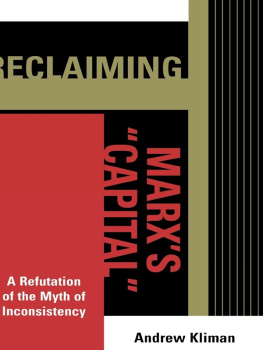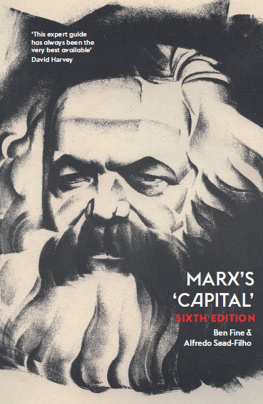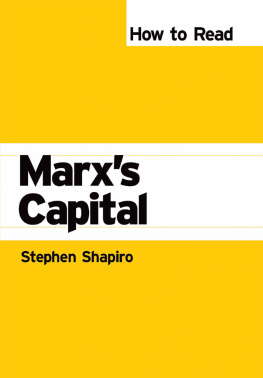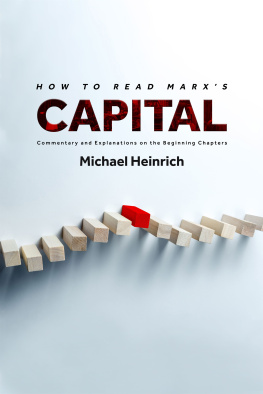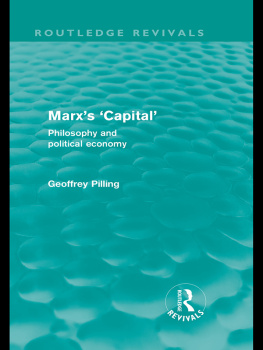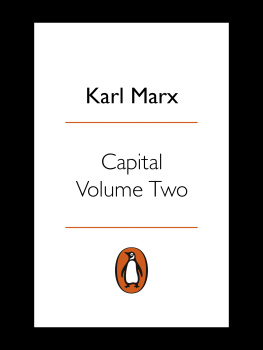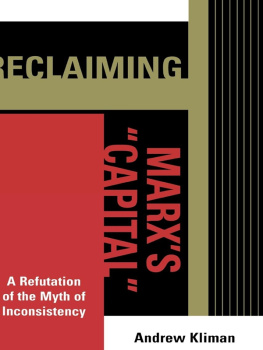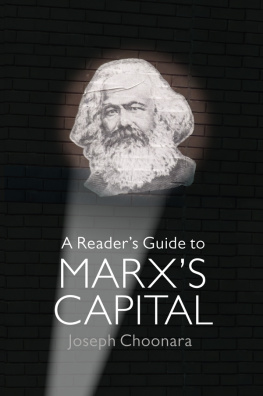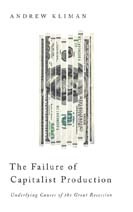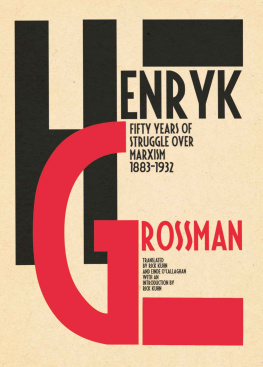Andrew Kliman - Reclaiming Marxs Capital
Here you can read online Andrew Kliman - Reclaiming Marxs Capital full text of the book (entire story) in english for free. Download pdf and epub, get meaning, cover and reviews about this ebook. year: 2013, publisher: Lexington Books, genre: Science. Description of the work, (preface) as well as reviews are available. Best literature library LitArk.com created for fans of good reading and offers a wide selection of genres:
Romance novel
Science fiction
Adventure
Detective
Science
History
Home and family
Prose
Art
Politics
Computer
Non-fiction
Religion
Business
Children
Humor
Choose a favorite category and find really read worthwhile books. Enjoy immersion in the world of imagination, feel the emotions of the characters or learn something new for yourself, make an fascinating discovery.
- Book:Reclaiming Marxs Capital
- Author:
- Publisher:Lexington Books
- Genre:
- Year:2013
- Rating:3 / 5
- Favourites:Add to favourites
- Your mark:
- 60
- 1
- 2
- 3
- 4
- 5
Reclaiming Marxs Capital: summary, description and annotation
We offer to read an annotation, description, summary or preface (depends on what the author of the book "Reclaiming Marxs Capital" wrote himself). If you haven't found the necessary information about the book — write in the comments, we will try to find it.
Reclaiming Marxs Capital — read online for free the complete book (whole text) full work
Below is the text of the book, divided by pages. System saving the place of the last page read, allows you to conveniently read the book "Reclaiming Marxs Capital" online for free, without having to search again every time where you left off. Put a bookmark, and you can go to the page where you finished reading at any time.
Font size:
Interval:
Bookmark:
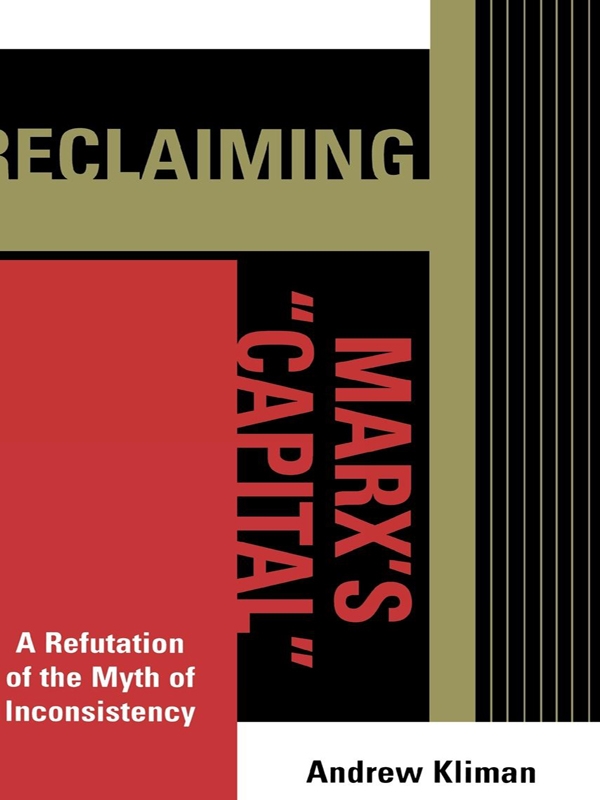
Andrew Kliman is professor of economics at Pace University in Pleasantville, New York. A member of Phi Beta Kappa, he holds B.A. and Ph.D. degrees in economics from the University of Maryland and the University of Utah, respectively. Co-editor of Critique of Political Economy, a new pluralistic and interdisciplinary scholarly journal, he has served as co-organizer of the International Working Group on Value Theory since 1993. He is also a co-founder of and teacher at The New SPACE (The New School for Pluralistic Anti-Capitalist Education) in New York City, where he and his wife reside.
Professor Kliman is a co-editor of and contributor to The New Value Controversy and the Foundations of Economics. Other edited collections to which he has contributed include Marx and Non-equilibrium Economics, Un Vecchio Falso Problema / An Old Myth, and Value and the World Economy Today. His work has also appeared in numerous scholarly journals, including Beitrge zur Marx-Engels-Forschung, the Cambridge Journal of Economics, Capital and Class, Historical Materialism, Political Economy, Research in Political Economy, and Review of Political Economy. He is currently working on a study guide and commentary to volumes II and III of Capital.
Alberro, Jos and Joseph Persky. 1981. The Dynamics of Fixed Capital Revaluation and Scrapping, Review of Radical Political Economics 13:2, 2137.
Arthur, Christopher J. 2001. Value, Labour and Negativity, Capital and Class 73, 1539.
Baggini, Julian and Peter S. Fosl. 2003. The Philosophers Toolkit: A compendium of philosophical concepts and methods. Malden, Mass. and Oxford: Blackwell.
Barkai, Haim. 1965. Ricardos Static Equilibrium, Economica 32, no. 125, 1531.
. 1967. A Note on Ricardos Notions of Demand, Economica 34, no. 133, 7579.
Baumol, William J. 1974. The Transformation of Values: What Marx really meant (an interpretation), Journal of Economic Literature 12:1, 5162.
Bellofiore, Riccardo (ed.). 1998. Marxian Economics. A reappraisal. Vol. 2: Essays on volume III of Capital: profit, prices and dynamics. London: Macmillan.
. 2002. Transformation and the Monetary Circuit: Marx as a monetary theorist of production. In Campbell, Martha and Geert Reuten (eds.), The Culmination of Capital: Essays on volume III of Marxs Capital. Houndmills, UK: Palgrave Macmillan, 10227.
. 2005. A Ghost Turning into a Vampire: The concept of capital and living labour. Presented at Historical Materialism conference, Univ. of London, Nov. 5.
Bhm-Bawerk, Eugen von. 1984 (1896). Karl Marx and the Close of his System.
Bortkiewicz, Ladislaus von. 1952 (19061907). Value and Price in the Marxian System, International Economic Papers 2, 560.
. 1984 (1907). On the Correction of Marxs Fundamental Theoretical Construction in the Third Volume of Capital. In Bhm-Bawerk 1984, 197221.
Brenner, Robert. 1998. The Economics of Global Turbulence, New Left Review 229, 1265.
Brewer, Anthony. 1995. A Minor Post-Ricardian?: Marx as an economist, History of Political Economy 27:1, 11145.
Butterfield, Herbert. 1965 (1931). The Whig Interpretation of History. New York: W. W. Norton.
Carchedi, Guglielmo. 1984. The Logic of Prices as Values, Economy and Society 13:4, 43155.
. 2002. The Art of Fudging. In Vasapollo, Luciano (ed.), Un Vecchio Falso Problema/An Old Myth. Rome: Laboratorio per la Critica Sociale, 15790.
. 2005. Sapiens Nihil Affirmat Quod Non Probat, Review of Political Economy 17:1, 12739.
Cassidy, John. 1997. The Return of Karl Marx, The New Yorker, Oct. 20 & 27, 248ff.
Chalmers, Alan. 1990. Science and Its Fabrication. Minneapolis: University of Minnesota Press.
Charasoff, Georg von. 1910. Das System des Marxismus: Darstellung und kritik. Berlin: Hans Bondy.
Cockshott, Paul and Allin Cottrell. 1998. Does Marx Need to Transform? In Bellofiore (ed.) 1998, 7085.
. 2005. Robust correlations between sectoral prices and labour values: a comment, Cambridge Journal of Economics 29:2, 30916.
Connolly, John M. and Thomas Keutner. 1988. Introduction: Interpretation, Decidability, and Meaning. In Connolly and Keutner (eds.), Hermeneutics versus Science?: Three German views. Notre Dame: Univ. of Notre Dame Press, 167.
Croce, Benedetto. 1914. Historical Materialism and the Economics of Karl Marx. London: Allen & Unwin.
Cullenberg, Stephen. 1994. The Falling Rate of Profit: Recasting the Marxian debate. London: Pluto.
Darwin, Charles. 1872 (1859). The Origin of Species, 6th ed. London: John Murray.
Desai, Meghnad. 1988. The Transformation Problem, Journal of Economic Surveys 2:4, 295333.
. 2002. Marxs Revenge: The resurgence of capitalism and the death of statist socialism. London and New York, Verso.
Dmitriev, V. K. 1974 (1898). Economic Essays on Value, Competition and Utility. Cambridge: Cambridge Univ. Press.
Dobb, Maurice. 1972. The Sraffa System and Critique of the Neo-Classical Theory of Distribution. In Hunt and Schwartz (eds.) 1972, 20521.
Dumnil, Grard. 1980. De la Valeur aux Prix de Production: Une rinterprtation de la transformation. Paris: Economica.
. 1983. Beyond the Transformation Riddle: A labor theory of value, Science & Society 47:4, 42750.
Dumnil, Grard and Dominique Lvy. 2000. The Conservation of Value: A rejoinder to Alan Freeman, Review of Radical Political Economics 32.1, 11946.
Dunayevskaya, Raya. 1991 (1982). Rosa Luxemburg, Womens Liberation, and Marxs Philosophy of Revolution, 2nd ed. Urbana, IL and Chicago: Univ. of Illinois Press.
. 2000 (1958). Marxism and Freedom: From 1776 until today, 6th ed. Amherst, NY: Humanity Books.
. 2003 (1973). Philosophy and Revolution: From Hegel to Sartre, and from Marx to Mao, 4th ed. Lanham, Md.: Lexington Books.
Dunbar, Robin. 1995. The Trouble with Science, Cambridge: Harvard Univ. Press.
Ernst, John R. 1982. Simultaneous Valuation Extirpated: A contribution to the critique of the neo-Ricardian concept of value, Review of Radical Political Economics 14:2, 8594.
Farjoun, Emmanuel and Mosh Machover. 1983. Laws of Chaos. London: Verso.
Feyerabend, Paul. 1988 (1975). Against Method, revised ed. London and New York: Verso.
. 2002 (1987). Farewell to Reason. London and New York: Verso. Fish, Stanley. 1980. What Makes an Interpretation Acceptable?. In Fish, Stanley, Is There a Text in This Class?: The authority of interpretive communities. Cambridge: Harvard Univ. Press, 33855.
Foley, Duncan K. 1982. The Value of Money, the Value of Labor Power and the Marxian Transformation Problem, Review of Radical Political Economics 14:2, 3747.
. 1986. Understanding Capital: Marxs economic theory. Cambridge: Harvard Univ. Press.
. 1997. Review of Marx and Non-Equilibrium Economics, Eastern Economic Journal 23:4, 49396.
. 1999. Response to David Laibman, Research in Political Economy 17, 22933.
. 2000a. Recent Developments in the Labor Theory of Value, Review of Radical Political Economics 32:1, 139.
. 2000b. Response to Freeman and Kliman, Research in Political Economy 18, 279-83.
Freeman, Alan. 1984. The Logic of the Transformation Problem. In Mandel and Freeman (eds.) 1984, 22164.
. 1996. Price, Value and Profita continuous, general, treatment. In Freeman and Carchedi (eds.) 1996b, 22579.
. 1997. If Theyre So Rich, Why Aint They Smart?: Another prelude to the critique of economic theory. Unpublished paper, Univ. of Greenwich, UK. www.greac.uk/~fa03/research/7a-eaepe97.rtf . (Dec. 19, 2005).
. 1998. The Transformation of Prices into Values: Comment on the chapters by Simon Mohun and Anwar M. Shaikh. In Bellofiore (ed.) 1998, 27075.
Font size:
Interval:
Bookmark:
Similar books «Reclaiming Marxs Capital»
Look at similar books to Reclaiming Marxs Capital. We have selected literature similar in name and meaning in the hope of providing readers with more options to find new, interesting, not yet read works.
Discussion, reviews of the book Reclaiming Marxs Capital and just readers' own opinions. Leave your comments, write what you think about the work, its meaning or the main characters. Specify what exactly you liked and what you didn't like, and why you think so.

